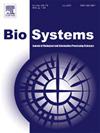From reactions to reflection: A recursive framework for the evolution of cognition and complexity
IF 1.9
4区 生物学
Q2 BIOLOGY
引用次数: 0
Abstract
This paper presents a comprehensive framework that traces the evolution of consciousness through a continuum of recursive processes spanning reaction, temporogenesis, symbiogenesis, and cognogenesis. By integrating biological cooperation, temporal structuring, and self-referential processing, our model provides a novel perspective on how complexity emerges and scales across evolutionary time. Reaction is established as the foundational mechanism that enables adaptive responses to environmental stimuli, which, through recursive refinement, transitions into temporogenesis—the synchronization of internal processes with external temporal rhythms. Symbiogenesis further enhances this process by fostering cooperative interactions at multiple biological levels, facilitating the emergence of higher-order cognitive functions. Cognogenesis represents the culmination of these recursive processes, where self-awareness and intentionality arise through iterative feedback loops. Our framework offers a biologically grounded pathway to addressing the "hard problem" of consciousness by proposing that subjective experience emerges as a result of progressively complex recursive interactions rather than as a static or isolated phenomenon. In comparing our approach with established theories such as Integrated Information Theory, Global Workspace Theory, and enactive cognition, we highlight its unique contributions in situating consciousness within a broader evolutionary and biological context. This work aims to provide a foundational model that bridges the gap between reaction and reflection, offering empirical avenues for further exploration in neuroscience, evolutionary biology, and artificial intelligence.
从反应到反思:认知和复杂性进化的递归框架。
本文提出了一个全面的框架,通过一系列递归过程追溯意识的进化,包括反应、时间发生、共生发生和知觉发生。通过整合生物合作、时间结构和自我参照处理,我们的模型为复杂性如何在进化时间内出现和扩展提供了一个新的视角。反应被认为是对环境刺激产生适应性反应的基本机制,这种适应性反应通过递归细化转变为时间发生——内部过程与外部时间节奏的同步。共生现象通过在多个生物水平上促进合作互动进一步加强了这一过程,促进了高阶认知功能的出现。Cognogenesis代表了这些递归过程的顶点,其中自我意识和意向性通过迭代反馈循环产生。我们的框架提供了一个基于生物学的途径来解决意识的“难题”,提出主观经验是逐渐复杂递归相互作用的结果,而不是静态或孤立的现象。在将我们的方法与诸如集成信息理论、全球工作空间理论和行动认知等已建立的理论进行比较时,我们强调了它在将意识置于更广泛的进化和生物背景下的独特贡献。这项工作旨在提供一个基础模型,弥合反应和反思之间的差距,为神经科学、进化生物学和人工智能的进一步探索提供经验途径。
本文章由计算机程序翻译,如有差异,请以英文原文为准。
求助全文
约1分钟内获得全文
求助全文
来源期刊

Biosystems
生物-生物学
CiteScore
3.70
自引率
18.80%
发文量
129
审稿时长
34 days
期刊介绍:
BioSystems encourages experimental, computational, and theoretical articles that link biology, evolutionary thinking, and the information processing sciences. The link areas form a circle that encompasses the fundamental nature of biological information processing, computational modeling of complex biological systems, evolutionary models of computation, the application of biological principles to the design of novel computing systems, and the use of biomolecular materials to synthesize artificial systems that capture essential principles of natural biological information processing.
 求助内容:
求助内容: 应助结果提醒方式:
应助结果提醒方式:


